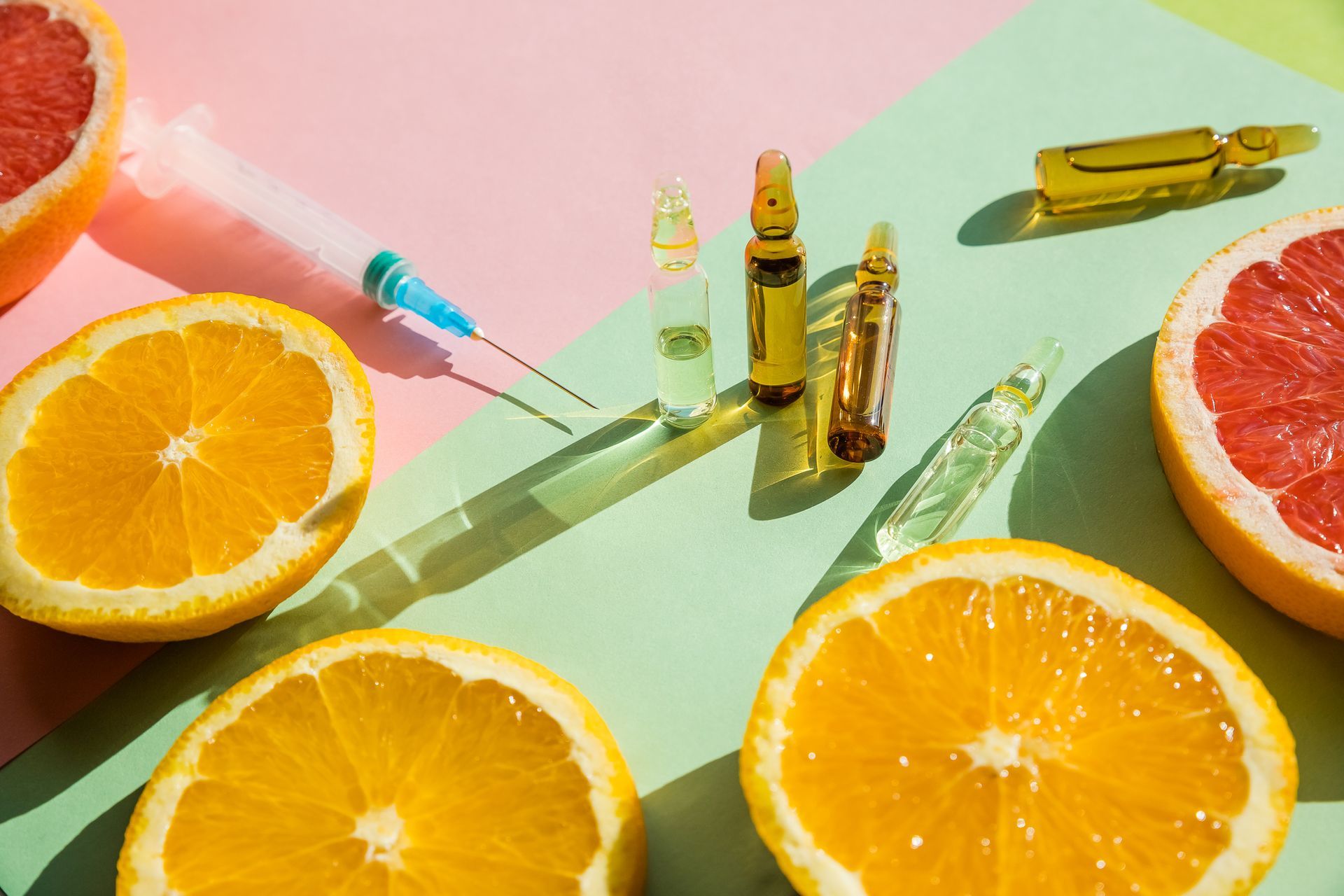The Essential B Vitamins: B1, B2, B3, and B5 - Part 1
This is a subtitle for your new post

When it comes to B vitamins, there’s a lot of confusion—especially about the so-called “missing” B vitamins like B4, B8, B10, and B11. Don’t worry—they’re not actually missing! These were once thought to be essential vitamins, but later research showed they either aren’t essential for humans or were reclassified as something else.
That leaves us with the true wellness powerhouses: B1, B2, B3, B5, B6, B7, B9, and B12. These water-soluble vitamins are superheroes for energy, brain health, nerves, skin, and more.
In Part 1 of our B vitamins blog, we’re focusing on the first four: B1, B2, B3, and B5, breaking down what they do, where to find them, and why they’re so important for your daily wellness.
What Are B1, B2, B3, and B5?
B vitamins are all about energy and metabolism. They help your body convert the food you eat—carbs, fats, and proteins—into ATP, the molecule your cells use for fuel. Without them, your body would struggle to keep your brain sharp, your nerves firing, and your heart beating efficiently.
- B1 (Thiamine) is often called the “energy vitamin” because it fuels every cell in your body. It’s especially important for your nervous system and heart.
- B2 (Riboflavin) acts like a spark plug, helping your body release energy from food while also keeping your skin, eyes, and red blood cells healthy.
- B3 (Niacin) supports energy production and helps maintain healthy cholesterol, DNA repair, and brain function.
- B5 (Pantothenic Acid) is behind-the-scenes power for energy metabolism, hormone production, red blood cells, nerves, and skin health.
Together, these four B vitamins are the foundation for feeling energetic, focused, and balanced.
Benefits of B1, B2, B3, and B5
Each B vitamin has unique powers, but they often work together to keep your body functioning at its best.
B1 (Thiamine) is crucial for converting carbs into energy. Every cell, especially those in your heart, brain, and nervous system, depends on thiamine to work properly. Low B1 levels can cause fatigue, muscle weakness, or nerve problems like tingling and poor balance. Research also suggests thiamine may support blood sugar balance, eye health, and even help protect your immune system from stress-related inflammation.
B2 (Riboflavin) helps your body use other B vitamins and plays a big role in red blood cell production. It’s involved in hundreds of metabolic reactions and protects your eyes and skin. Low B2 over time may increase the risk of cataracts. Riboflavin also supports energy, meaning that if you’re feeling unusually tired or your skin is dry, riboflavin could be part of the solution.
B3 (Niacin) works closely with your cells’ “helper molecules” (NAD and NADP) to convert food into energy and repair DNA. It also helps keep your cholesterol in check by supporting HDL (“good”) cholesterol and may protect brain function as you age. Niacin is unique because it has been studied for migraine prevention, heart health, and cognitive support, though high doses should only be taken under medical supervision.
B5 (Pantothenic Acid) helps convert food into energy and is essential for making hormones like cortisol, which helps your body manage stress. It also supports healthy skin, nerve function, red blood cell production, and wound healing. Pantothenic acid’s versatility makes it a quiet superstar in daily wellness, especially for people with high stress or active lifestyles.
Where to Find B1, B2, B3, and B5
Most people get enough of these vitamins through a balanced diet, but modern lifestyles sometimes make supplementation helpful.
Food Sources
You can find B vitamins in a variety of foods:
- B1 (Thiamine): Whole grains, beans, pork, fish, and fortified breads or cereals
- B2 (Riboflavin): Milk, yogurt, eggs, lean meats, liver, green leafy vegetables, almonds, fortified grains
- B3 (Niacin): Chicken, turkey, beef, fish, mushrooms, potatoes, nuts, legumes, whole grains
- B5 (Pantothenic Acid): Chicken, beef, eggs, mushrooms, avocados, lentils/beans, whole grains, broccoli, yogurt
Supplements & IV Therapy
B vitamins are water-soluble, so your body doesn’t store large amounts. That means you need regular intake, either through food, supplements, and can even receive B vitamins through IV therapy. At Blossom Med, many of our IV infusions contain B vitamins and deliver them directly into your bloodstream for rapid absorption. This can be especially useful if you have dietary restrictions, absorption issues, or want a quick energy boost.
Signs of Deficiency
Deficiencies in B1–B5 are rare in developed countries but can occur in certain situations. It’s helpful to know the early warning signs:
- B1: Fatigue, memory problems, irritability, numbness or tingling, poor balance
- B2: Cracks around the mouth, sore tongue, dry or peeling skin, red or sensitive eyes, fatigue
- B3: Skin rash, diarrhea, mood changes, memory issues (rare in the U.S.)
- B5: Fatigue, headaches, irritability, numbness, stomach discomfort, muscle cramps, poor skin health
People who may be at higher risk include older adults, those with alcohol dependence, certain chronic illnesses, or anyone on medications that interfere with B vitamin absorption.
How Much Do You Need?
Recommended daily intakes:
- B1 (Thiamine): ~1.1–1.2 mg/day for adults
- B2 (Riboflavin): ~1.1–1.3 mg/day for adults
- B3 (Niacin): Men 16 mg NE/day, Women 14 mg NE/day
- B5 (Pantothenic Acid): Adults ~5 mg/day
Because these vitamins are water-soluble, daily intake is important for maintaining energy, nerve health, and metabolism. If you are pregnant or breast feeding please make sure to consult your healthcare provider.
Medication Interactions
These B vitamins are generally safe, but a few considerations:
- High doses of B5 may interact with cholesterol-lowering medications (statins) or certain antibiotics (tetracyclines).
- Always tell your healthcare provider if you’re taking supplements or IV vitamins alongside prescription medications.
Final Thoughts
B1, B2, B3, and B5 are the everyday heroes in your daily nutrition. They keep your energy levels steady, support your brain and nervous system, help your heart and red blood cells, and even contribute to healthy skin and stress management. You can get them from a balanced diet, supplements, or one of our many IV infusions at Blossom Med for fast, efficient support. By keeping these B vitamins in balance, you give your body the foundation it needs to thrive.
References
- Cleveland Clinic – Vitamin B1 (Thiamine): https://health.clevelandclinic.org/vitamin-b1
- NIH ODS – Thiamin Fact Sheet: https://ods.od.nih.gov/factsheets/Thiamin-HealthProfessional/
- Harvard T.H. Chan School of Public Health – Vitamin B1: https://nutritionsource.hsph.harvard.edu/vitamin-b1/
- Mayo Clinic – Riboflavin (B2): https://www.mayoclinic.org/drugs-supplements/riboflavin-oral-route/description/drg-20065810
- NIH ODS – Riboflavin Fact Sheet: https://ods.od.nih.gov/factsheets/Riboflavin-HealthProfessional/
- Cleveland Clinic – Vitamin B2: https://health.clevelandclinic.org/vitamin-b2
- Harvard T.H. Chan – Riboflavin: https://nutritionsource.hsph.harvard.edu/riboflavin-vitamin-b2/
- UCLA Health – Does Niacin Help Lower Cholesterol: https://www.uclahealth.org/news/article/ask-the-doctors-does-niacin-help-lower-cholesterol
- Harvard T.H. Chan – Niacin: https://nutritionsource.hsph.harvard.edu/niacin-vitamin-b3/
- NIH ODS – Niacin Fact Sheet: https://ods.od.nih.gov/factsheets/Niacin-HealthProfessional/
- NIH ODS – Pantothenic Acid Fact Sheet: https://ods.od.nih.gov/factsheets/PantothenicAcid-HealthProfessional/
- Harvard T.H. Chan – Pantothenic Acid: https://nutritionsource.hsph.harvard.edu/pantothenic-acid-vitamin-b5/
- Cleveland Clinic – Vitamin B5 (Pantothenic Acid): https://health.clevelandclinic.org/vitamin-b5-pantothenic-acid









